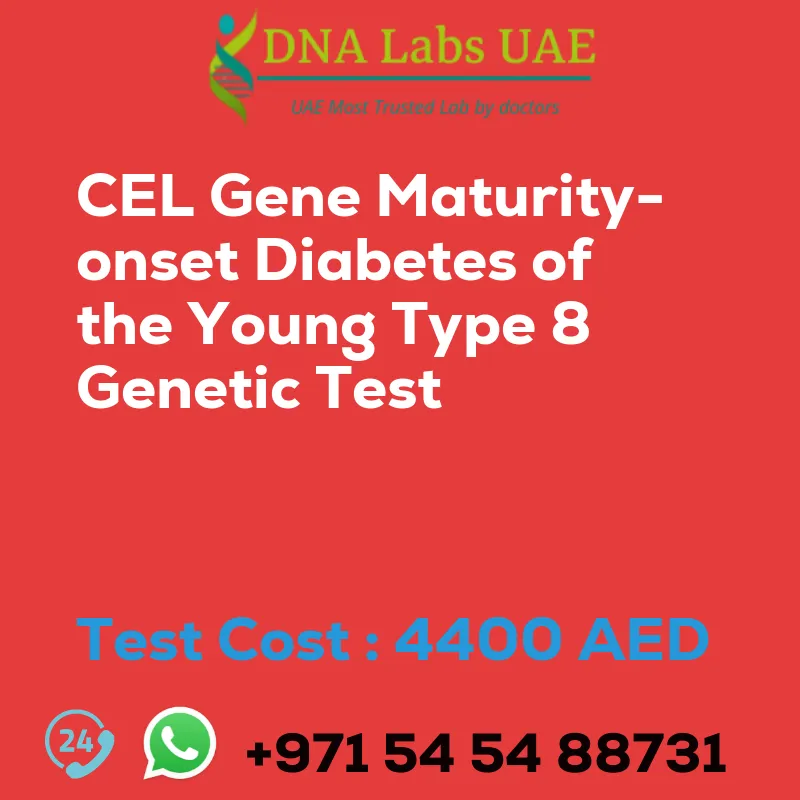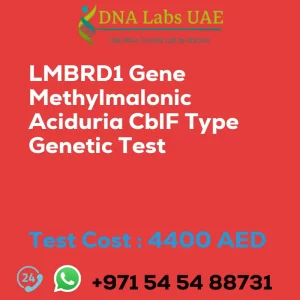CEL Gene Maturity-onset diabetes of the young type 8 Genetic Test
Test Name: CEL Gene Maturity-onset diabetes of the young type 8 Genetic Test
Components: Blood or Extracted DNA or One drop Blood on FTA Card
Price: 4400.0 AED
Sample Condition: Blood or Extracted DNA or One drop Blood on FTA Card
Report Delivery: 3 to 4 Weeks
Method: NGS Technology
Test type: Metabolic Disorders
Doctor: General Physician
Test Department: Genetics
Pre Test Information: Clinical History of Patient who is going for CEL Gene Maturity-onset diabetes of the young type 8 NGS Genetic DNA Test. A Genetic Counselling session to draw a pedigree chart of family members affected with Maturity-onset diabetes of the young type 8.
Test Details: CEL Gene Maturity-onset diabetes of the young type 8 NGS Genetic Test is a genetic test that analyzes the CEL gene for mutations associated with maturity-onset diabetes of the young type 8 (MODY 8). MODY 8 is a rare form of diabetes characterized by high blood sugar levels that typically begin in adolescence or early adulthood. The CEL gene provides instructions for producing the carboxyl ester lipase enzyme, which is involved in the breakdown of dietary fats in the pancreas. Mutations in the CEL gene can disrupt the normal function of the enzyme, leading to impaired insulin secretion and the development of MODY 8. The NGS (Next-Generation Sequencing) technique used in this genetic test allows for the analysis of multiple genes simultaneously, providing a comprehensive assessment of genetic variants associated with MODY 8. This test can help in the diagnosis and management of individuals with suspected MODY 8, as well as in identifying at-risk family members who may benefit from early intervention and monitoring. It is important to note that this genetic test is typically ordered by healthcare professionals and should be interpreted in conjunction with clinical symptoms, family history, and other relevant information. Genetic counseling is often recommended before and after undergoing genetic testing to discuss the implications of the results and provide guidance on potential treatment and management options.
| Test Name | CEL Gene Maturity-onset diabetes of the young type 8 Genetic Test |
|---|---|
| Components | |
| Price | 4400.0 AED |
| Sample Condition | Blood or Extracted DNA or One drop Blood on FTA Card |
| Report Delivery | 3 to 4 Weeks |
| Method | NGS Technology |
| Test type | Metabolic Disorders |
| Doctor | General Physician |
| Test Department: | Genetics |
| Pre Test Information | Clinical History of Patient who is going for CEL Gene Maturity-onset diabetes of the young type 8 NGS Genetic DNA Test A Genetic Counselling session to draw a pedigree chart of family members affected with Maturity-onset diabetes of the young type 8 |
| Test Details |
CEL Gene Maturity-onset diabetes of the young type 8 NGS Genetic Test is a genetic test that analyzes the CEL gene for mutations associated with maturity-onset diabetes of the young type 8 (MODY 8). MODY 8 is a rare form of diabetes characterized by high blood sugar levels that typically begin in adolescence or early adulthood. The CEL gene provides instructions for producing the carboxyl ester lipase enzyme, which is involved in the breakdown of dietary fats in the pancreas. Mutations in the CEL gene can disrupt the normal function of the enzyme, leading to impaired insulin secretion and the development of MODY 8. The NGS (Next-Generation Sequencing) technique used in this genetic test allows for the analysis of multiple genes simultaneously, providing a comprehensive assessment of genetic variants associated with MODY 8. This test can help in the diagnosis and management of individuals with suspected MODY 8, as well as in identifying at-risk family members who may benefit from early intervention and monitoring. It is important to note that this genetic test is typically ordered by healthcare professionals and should be interpreted in conjunction with clinical symptoms, family history, and other relevant information. Genetic counseling is often recommended before and after undergoing genetic testing to discuss the implications of the results and provide guidance on potential treatment and management options. |








